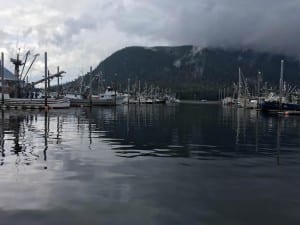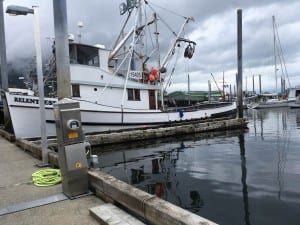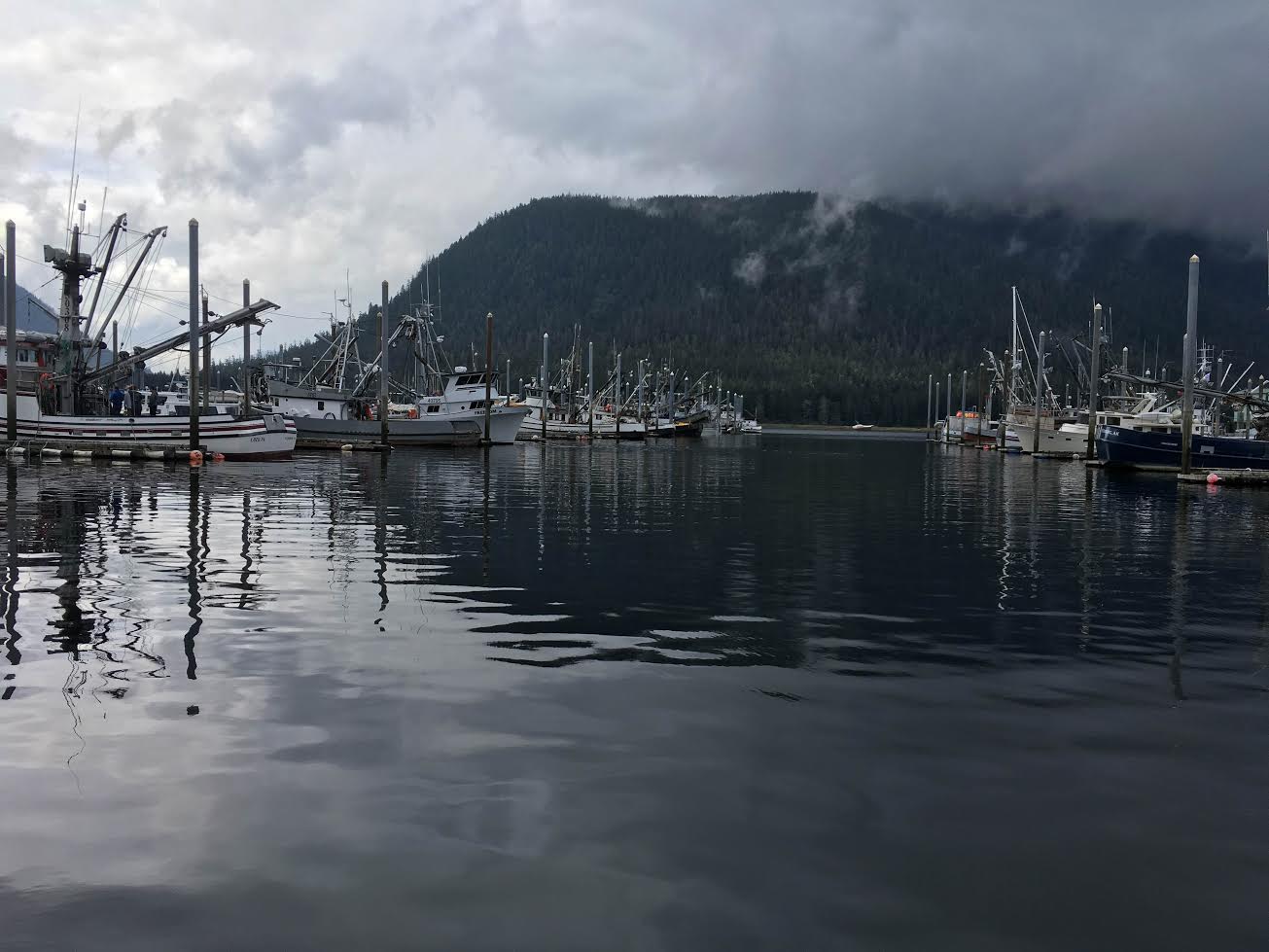
Despite a one-day seining opening in the region, many seiners docked in Petersburg and removed their nets. (Photo/Abbey Collins)
The pink salmon season in Southeast is supposed to be peaking right now. Instead, the run is actually slowing, harvests have been poor, and as KFSK’s Abbey Collins reports from Petersburg, many fishermen are wrapping up the season early.
The F/V Marathon is docked in Petersburg’s South Harbor.
“We’re done.”
That’s Jesse Agner, a crewmember on the boat. Out of the 12 years he’s been seining he says this is one of the worst he’s ever seen.
“We put the skiff away yesterday and we’re going to get rid of everything else in short order,” says Agner.
I meet the Marathon’s acting captain Allan Mathisen on his dad’s boat. Normally, at this point in the summer Mathisen and the Marathon crew would probably be out seining for the peak of pink salmon season, but not this year.
“Which was really hard for my father to swallow and a lot of us to swallow because we just expected to be out fishing for three more weeks,” says Mathisen.
Instead, the boat is stationary.
“By all metrics and indications from the female sex ratio, to the number other districts are reporting in, the absolute disaster the North End was, it’s just not there, says Mathisen. There’s not waves of fish waiting to come in. It’s over.”
Mathisen has been fishing for 17 years. He loves this particular fishery and being out on the water during summer in Alaska. He calls it ‘seincation.’ And even though the pinks were poor this year, he wouldn’t call this season a disaster. The crew focused on chum salmon.
“We were really lucky because we hit the dogs early on,” says Mathisen. “Because we’re getting paid three times as much with them it really helped out our gross stock. Monetarily it was probably the same for us as last year even though we caught, gosh, maybe 200,000 or more less pounds.”
Still, they’re done seining for this year and will be parked in town until it’s time to long line.
The Marathon is not the only seine boat that’s back early. Far from it. Several fishermen around the harbor have removed their nets, indicating the season is over. Chris MacFadyen works on the F/V Relentless. This time of year he’s usually fishing for pink salmon. But today, his net is off and he’s closing down the boat.
“This is very, very unnatural,” says MacFadyen.
MacFadyen has been fishing since he was around 10 and says this year was one of the worst for seining.
“That’s for sure, usually we have a few weeks left of really strong fishing,” says MacFadyen. “To be done this early is just unheard of.”

The F/V Relentless docked in Petersburg’s South Harbor and the crew removed their net. (photo/Abbey Collins)
Soon, he’ll move to a new vessel to longline for black cod and halibut. He says a season like this definitely hurts his income. But he’s still optimistic.
“But you hope the next fishery carries on and not have all your eggs in one basket,” says MacFadyen. Hopefully in the next couple years you get enough return in the creeks that it’s better than this year was.”
The pre-season forecast for the region was 34 million fish. That’s below average, but not actually that bad, historically speaking. And for an even year, it’s pretty decent.
“There’s a disparity over the last couple decades at least between the even and odd year runs.”
Troy Thynes is an area management biologist for the Alaska Department of Fish and Game in Petersburg.
“The odd years have been a lot larger than the even years,” says Thynes.
The actual returns are nowhere near the forecast. Thynes says the estimated pink salmon harvest so far is around 14 million fish.
“We’re expecting the harvest right now, it might be upwards of 15 million,” says Thynes.
That’s less than half of the pre-season forecast.
Historically, Thynes says this year’s harvest is on the low end for recent years, but it’s still not the lowest when you look at the last decade.
Still, this time of the summer should be peak pink season. But this year, Thynes says that peak came at the end of last month.
“It looks like most of the pink salmon runs throughout Southeast came in a week or two earlier than normal and then a weak at that,” says Thynes. “I shouldn’t say weak overall, there were definitely some strong runs that came in, especially South of Petersburg, in the Ketchikan management area. They had some strong returns of pink salmon down there.”
As predicted, runs were generally weaker North of Petersburg and stronger South. Back on the boat, Mathisen sips his coffee in the boat’s galley. We look out to the deck where the net still sits, but won’t be for long. He says they knew the Northern region would be slow.
“No one really expected the North end to be rock stars this year but I don’t think anyone expected it to be as a ghost town that it was,” says Mathisen.
That sent more fishermen like Mathisen South.
“Normally it would really diversify the fleet a little bit,” says Mathisen. “You’d have maybe half on the North, half on the South, but because there was no show on the North end, the entire fleet was concentrated in the South and that put a lot of pressure on those districts.”
Seiners make up the bulk of boats fishing for pink salmon, along with gill netters. At peak, around 240 seiners were out fishing.
Longtime fishermen like Mathisen, are just not that worried about the poor season.
“They just had poor recruitment in the ocean,” says Mathisen. “That happens. It’s not a big deal, I don’t think. That’s why you have 10 year averages. That’s why you have 25-year averages. It just happens.”
The season isn’t officially over. The Alaska Department of Fish and Game is continuing to hold limited openings where there are excess fish.
And some boats have not given up yet.
Editor’s note: This story has been corrected to show comments from the F/V Relentless attributed to Chris MacFadyen, not his father Jeff.










